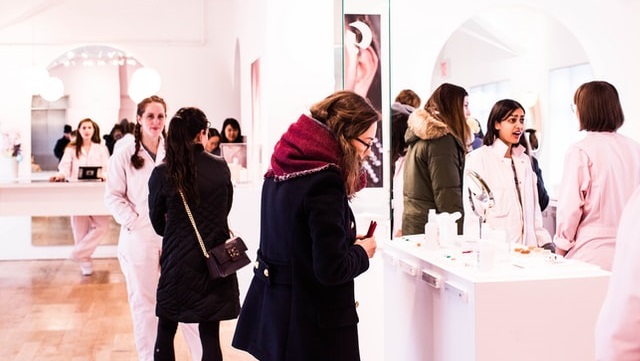The glossier showroom in New York City. Photo by Charisse Kenion on Unsplash The collective unconscious consists of the sum of the instincts and their correlates, the archetypes. Just as everybody possesses instincts, so he also possesses a stock of archetypal images. – Carl Jung Redefine, reimagine, research, rebuild, replay and so the list goes on. Will there ever be a new normal, or a ‘back to the future’ if you like? Is online activity, a natural outcome of this global heal
obal health crisis, going to become the new order of retail? Really?
The physical shopping experience may not be over quite yet, but actually, why would people head back to malls and shops again post-COVID?
Firstly, the human instinct is to be social. For most people, extended periods of isolation have a negative consequence.
This social instinct defined as the desire for social contact and a feeling of belonging, as manifested by the tendency to congregate, affiliate and engage in group behaviours.
In the individual psychology of Alfred Adler, it is defined as the innate drive for cooperation that leads individuals to incorporate social interest and the common good into their efforts to achieve self-realisation.
Put another way, we generally like the physical and social nature of our shopping experiences, hanging out at the mall, being part of a community or perhaps a tribe.
We also know that it is our limbic brain, the processor of our human emotion, that drives our buying decisions, at a ratio off 6:1, on average, over the functional logical rational context.
Shopping in the physical sense is our best shot at triggering the human emotion hands down. Online is quite the opposite.
The other factor is that we are also largely creatures of habit, and binaural scientists at Amazon and the like know that at least 65 per cent of our grocery purchases are of the same product and brand. This also tells us that we have repeated neuron pathways that cause us to do what we do habitually, a little like muscle memory.
Given all that, is it likely that we will abandon physical shopping in droves for the pleasures of being singular, isolated and keyboard dependent, breaking our habitual behaviour and need for social context?
I don’t believe so.
I believe the new normal will show an acceleration of our understanding of online production, transaction and usage, and this will increase naturally as a consequence, but it can’t and won’t replace the physical shopping experience, especially done well.
There can and should be a channel for online within the branded shopping experience – human, interesting, fascinating, fresh and, dare I say it, even a bit exciting.
Many would suggest that we are buying when we transact online and all the functional logic that entails, while physical shopping, on the other hand, is the genesis of emotional contact and context.
Naysayers may believe we will live in a world devoid of the physical shopping experience post-COVID, but even a rudimentary assessment of the human condition and its emotional drivers would certainly argue otherwise.
Brian Walker is founder and CEO of Retail Doctor Group, a retail advisory and consultancy group and the Australian elected partner member of the global retail expert’s alliance Ebeltoft Group. Visit:www.retaildoctor.com.au

